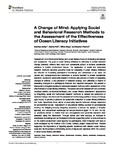A Change of Mind: Applying Social and Behavioral Research Methods to the Assessment of the Effectiveness of Ocean Literacy Initiatives
| dc.contributor.author | Ashley, M | |
| dc.contributor.author | Pahl, Sabine | |
| dc.contributor.author | Glegg, Gillian | |
| dc.contributor.author | Fletcher, S | |
| dc.date.accessioned | 2019-07-26T14:59:51Z | |
| dc.date.available | 2019-07-26T14:59:51Z | |
| dc.date.issued | 2019-06-06 | |
| dc.identifier.issn | 2296-7745 | |
| dc.identifier.issn | 2296-7745 | |
| dc.identifier.other | ARTN 288 | |
| dc.identifier.uri | http://hdl.handle.net/10026.1/14701 | |
| dc.description.abstract |
Assessment of environmental literacy and ocean literacy focus on increasing knowledge and awareness. The goal of ocean literacy initiatives is ultimately to enable behavior change (whereby citizens take direct and sustainable action) to achieve sustainable solutions to marine environment issues. The application of social and behavioral research methods provides powerful tools for assessing if ocean literacy initiatives are effective at increasing participant's knowledge and awareness of an issue, its causes and consequences and behaviors or actions required to enable sustainable solutions. Social and behavioral research methods also provide a means of assessing changes in attitude, a key predictor of behavior change, and ultimately a means of assessing changes in a participants intended and reported behaviors. We present a framework to integrate social and behavioral research methods within assessment of the effectiveness of ocean literacy initiatives. The before and after assessment we undertake develops existing environmental literacy and ocean literacy assessment approaches by integrating social and behavioral research methods to assess key predictors of behavior change. We structured the assessment methodology within a Theory of Change logic model, to provide a protocol for systematic evaluation of ocean literacy initiatives and tools. Specifically those aimed at promoting specific behavior change objectives for pre-identified actors. Assessment of educational training courses for professionals entering the shipping industry (targeting behaviors to reduce the spread of invasive species), and educational workshops for school students (aged 11-15 and 16-18), on problems related to marine litter and microplastics and potential solutions were assessed using the framework. Through before and after surveys, an increase in awareness, knowledge and an increase in attitudes supporting action to reduce impacts on the marine environment were reported by participants, after interaction with sets of tools developed by the Horizon 2020 Ocean Literacy project ResponSEAble. Results supported the importance of targeting specific audiences with tailored ocean literacy tools and the importance of informing actors of issues and solutions within the context of wider ocean literacy principles. | |
| dc.format.extent | 288- | |
| dc.language.iso | en | |
| dc.publisher | Frontiers Media | |
| dc.subject | ocean literacy | |
| dc.subject | behavioral science | |
| dc.subject | effectiveness | |
| dc.subject | education | |
| dc.subject | attitude | |
| dc.subject | sustainable development | |
| dc.subject | intended behavior | |
| dc.title | A Change of Mind: Applying Social and Behavioral Research Methods to the Assessment of the Effectiveness of Ocean Literacy Initiatives | |
| dc.type | journal-article | |
| dc.type | Journal Article | |
| plymouth.author-url | https://www.webofscience.com/api/gateway?GWVersion=2&SrcApp=PARTNER_APP&SrcAuth=LinksAMR&KeyUT=WOS:000470789800001&DestLinkType=FullRecord&DestApp=ALL_WOS&UsrCustomerID=11bb513d99f797142bcfeffcc58ea008 | |
| plymouth.issue | JUN | |
| plymouth.volume | 6 | |
| plymouth.publication-status | Published online | |
| plymouth.journal | Frontiers in Marine Science | |
| dc.identifier.doi | 10.3389/fmars.2019.00288 | |
| plymouth.organisational-group | /Plymouth | |
| plymouth.organisational-group | /Plymouth/Faculty of Health | |
| plymouth.organisational-group | /Plymouth/Faculty of Science and Engineering | |
| plymouth.organisational-group | /Plymouth/Faculty of Science and Engineering/School of Biological and Marine Sciences | |
| plymouth.organisational-group | /Plymouth/REF 2021 Researchers by UoA | |
| plymouth.organisational-group | /Plymouth/REF 2021 Researchers by UoA/UoA04 Psychology, Psychiatry and Neuroscience | |
| plymouth.organisational-group | /Plymouth/REF 2021 Researchers by UoA/UoA04 Psychology, Psychiatry and Neuroscience/UoA04 Psychology, Psychiatry and Neuroscience MANUAL | |
| plymouth.organisational-group | /Plymouth/REF 2021 Researchers by UoA/UoA14 Geography and Environmental Studies | |
| plymouth.organisational-group | /Plymouth/Research Groups | |
| plymouth.organisational-group | /Plymouth/Research Groups/Centre for Brain, Cognition and Behaviour (CBCB) | |
| plymouth.organisational-group | /Plymouth/Research Groups/Centre for Brain, Cognition and Behaviour (CBCB)/Behaviour | |
| plymouth.organisational-group | /Plymouth/Research Groups/Institute of Health and Community | |
| plymouth.organisational-group | /Plymouth/Research Groups/Marine Institute | |
| plymouth.organisational-group | /Plymouth/Users by role | |
| plymouth.organisational-group | /Plymouth/Users by role/Academics | |
| dcterms.dateAccepted | 2019-05-17 | |
| dc.rights.embargodate | 2019-12-3 | |
| dc.identifier.eissn | 2296-7745 | |
| dc.rights.embargoperiod | Not known | |
| rioxxterms.version | Version of Record | |
| rioxxterms.versionofrecord | 10.3389/fmars.2019.00288 | |
| rioxxterms.licenseref.uri | http://www.rioxx.net/licenses/all-rights-reserved | |
| rioxxterms.licenseref.startdate | 2019-06-06 | |
| rioxxterms.type | Journal Article/Review |


